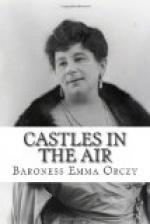Then it was that in the hour of my blackest despair a flash of genius pierced through the darkness of my misery. For some days now Madame Dupont, Farewell’s housekeeper, had been exceedingly affable to me. Every morning now, when I came to work, there was a cup of hot coffee waiting for me, and, when I left, a small parcel of something appetizing for me to take away.
“Hallo!” I said to myself one day, when, over a cup of coffee, I caught sight of her small, piggy eyes leering at me with an unmistakable expression of admiration. “Does salvation lie where I least expected it?”
For the moment I did nothing more than wink at the fat old thing, but the next morning I had my arm round her waist—a metre and a quarter, Sir, where it was tied in the middle—and had imprinted a kiss upon her glossy cheek. What that love-making cost me I cannot attempt to describe. Once Estelle came into the kitchen when I was staggering under a load of a hundred kilos sitting on my knee. The reproachful glance which she cast at me filled my soul with unspeakable sorrow.
But I was working for her dear sake; working that I might win her in the end.
A week later Mr. Farewell was absent from home for the evening. Estelle had retired to her room, and I was a welcome visitor in the kitchen, where Madame Dupont had laid out a regular feast for me. I had brought a couple of bottles of champagne with me and, what with the unaccustomed drink and the ogling and love-making to which I treated her, a hundred kilos of foolish womanhood was soon hopelessly addled and incapable. I managed to drag her to the sofa, where she remained quite still, with a beatific smile upon her podgy face, her eyes swimming in happy tears.
I had not a moment to lose. The very next minute I was in the study and with a steady hand was opening the drawers of the bureau and turning over the letters and papers which I found therein.
Suddenly an exclamation of triumph escaped my lips.
I held a packet in my hand on which was written in a clear hand: “The papers of Mlle. Estelle Bachelier.” A brief examination of the packet sufficed. It consisted of a number of letters written in English, which language I only partially understand, but they all bore the same signature, “John Pike and Sons, solicitors,” and the address was at the top, “168 Cornhill, London.” It also contained my Estelle’s birth certificate, her mother’s marriage certificate, and her police registration card.




